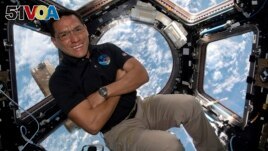24 September 2023
Researchers say a new drug compound has been found to prevent bone loss in humans visiting space.
The drug was tested on mice on the International Space Station (ISS). A new study reports the compound was engineered to help increase the formation of new bone material.
The American space agency NASA has long studied the effects of space travel on human health. Astronauts who have spent long periods in space have taken part in major studies that looked at their health before, during and after their trips, or missions.

This image provided by NASA shows astronaut Frank Rubio floating inside the cupola, the International Space Station's "window to the world." Rubio now holds the record for the longest U.S. spaceflight. (NASA via AP)
NASA announced that American astronaut Frank Rubio recently set the agency's record for the longest single spaceflight by a U.S. astronaut. Rubio, who is set to return to Earth on September 27, has spent 371 days in space. NASA astronaut Mark Vande Hei set the earlier record in March of 2022 after living in space for 355 days.
Some of the main health problems for humans are related to the gravitational conditions in space. Past studies have shown the low gravity environments in space can greatly reduce or stop the formation of new bone material.
NASA has estimated that astronauts spending more than six months in space can lose between six and 10 percent of bone matter. Some experiments in astronauts measured changes in their upper leg. Development of new bone can take at least three or four years after astronauts return to Earth, NASA says.
The conditions astronauts experience in space can result in bone loss up to 10 times more than is seen in human patients dealing with the bone loss disease osteoporosis, NASA notes.
Currently, physical exercise is the main method astronauts use to reduce bone loss during long periods in space. Generally, crew members aboard the ISS spend about 2.5 hours each day exercising in an effort to reduce the gravitational effects of space.
Past research on the subject has suggested a group of drugs widely used to treat osteoporosis, called bisphosphonates, have shown promise in Earth-based experiments on bone loss. That research continues.
But the new study shows success combining a bisphosphonate with another substance that has shown promise in helping to regrow bone material. That substance is called NELL-1. It was discovered by scientist Kang Ting at the Massachusetts-based Forsyth Institute.
The study was led by a team from the University of California, Los Angeles (UCLA). In a statement, the research team said the resulting compound, a molecule called BP-NELL-PEG, was given to mice aboard the ISS to test its effectiveness.
The experiments were carried out by astronauts who arrived on the ISS in June 2017. Half the mice remained on the ISS for nine weeks, while the rest were flown back to Earth four-and-a-half weeks after launch. Both sets of mice were given either BP-NELL-PEG or a salt solution containing no medicine.
The researchers reported both sets of mice who were given the BP-NELL-PEG compound showed "a significant increase in bone formation" during the experiment period. The team added that neither the mice treated on Earth nor those that received the drug in space experienced any observable side effects.
Chia Soo is with UCLA's School of Medicine and helped lead the research. She said the findings hold great promise for, in her words, "the future of space exploration, particularly for missions involving extended stays in microgravity."
Another member of the team was former UCLA engineering professor Benjamin Wu. He noted that the study could open the door to the same compound being used to treat patients with extreme osteoporosis and other bone-related conditions on Earth.
The scientists are still examining data on the live mice who returned to Earth halfway through the experiment. Researcher Soo said they hope the data "will provide some insight on how to help future astronauts recover from longer... space missions."
I'm Bryan Lynn.
Bryan Lynn wrote this story for VOA Learning English.
___________________________________________________
Words in This Story
significant – adj. important or noticeable
insight – n. the ability to understand what something is really like